#CB1 Receptors
Explore tagged Tumblr posts
Text
What Is Tetrahydrocannabinol?
(THC) naturally occurs in the brain.
youtube
Delta-9-Tetrahydrocannabinol: A Short Summary About THC.
Tetrahydrocannabinol (THC) is the primary psychoactive component of the cannabis plant. This cannabinoid was first isolated in 1964 by an Israeli Professor Dr. Raphael Mechoulam and Dr. Yechiel Gaoni. THC is currently a schedule I drug in the United States, meaning that it is deemed by the federal government to have no medicinal value whatsoever. One of the best ways to highlight this absurd notion is through the the double-standard of synthesizing of THC, a synthetic chemical that has been developed and legally sold in the United States under the name Marinol, which is available as a schedule III drug requiring a prescription.
THC is also a naturally occurring chemical with the human brain; this is where the psychoactive properties of THC come from. When you inhale or otherwise consume THC you flood your brain as well as the rest of your body with more THC than your body would naturally create on its own.
Tetrahydrocannabinol (THC) has a wide range of pain relief effects.
THC has a wide range from mild to moderate analgesic or pain relieving effect, and has been used to treat pain by alerting the release of signals from various bodily components such as the spinal cord. There are often a number of other effects, including relaxation and a modification of the senses such as sight and auditory response, in addition to an increase in appetite.
It is well known that cannabis consumption increases appetite and food intake in humans, which is believed to be a result of THC effects on the CB1 receptors in the hypothalamus of the human brain. A study with mice suggests that cannabis stimulates taste as well as the pleasure experienced in the consumption of food. These studies are showing that increased pleasure may not be the only cause for an increase in appetite under the influence of THC.
Cancer patients benefit from the use of THC.
Cancer patients often experience nausea from their chemotherapy as well as a loss in appetite. One of the hardest things cancer patients often deal with is a lack of nutrition as their appetite is either very low or nonexistent. Many of those suffering from cancer are finding marijuana and the THC within it to be a lifesaving appetite-stimulant which increases their appetite so they can eat, helping them take in the nutrition they desperately need. These same patients have also noticed a decrease in nausea, pain and other debilitating symptoms that other drugs have been unable to resolve without major addictions or side effects.
HIV/AIDS patients have also found relief from their conditions with THC, which reduces symptoms such as neuropathic pain induced by their therapy as well as an increase in weight gain. Because Marinol does not contain many of the other therapeutic components within real marijuana, like CBD, terpenoids, and flavonoids. AIDS/HIV sufferers who use this product may not achieve maximum benefit. Furthermore, some patients report that a single Marinol tablet frequently causes the patient to sleep or experience an all-day high that inhibits their cognitive ability throughout the day. Natural THC does not have the same effects, however, as the patient is able to carefully control their dose as well as take in the many other components of the natural drug.
Please share this with your friends.
youtube
#Tetrahydrocannabinol (THC)#Dr Raphael Mechoulam#Dr Yechiel Gaoni#Marinol#CB1 receptors#CBD#terpenoids#flavonoids#Cancer patients#medical marijuana#medical cannabis#Delta-9-Tetrahydrocannabinol
0 notes
Text
Artificial Intelligence
It's been a week, again! Here's my first Ramble since starting the blog. It's a little off topic, but it should lead to some interesting writing in the future. I hope you enjoy!
I could see myself doing an insane deep dive into Artificial Intelligence: there’s no lack of writing on the topic, it’s constantly improving, and we’re gaining access to it casually more and more every day. But this is a cannabis blog, and this was meant to be a filler post this week, as I am (as is noted in the AI chat I’m linking below) in between anniversary bookends, with my own having been…

View On WordPress
#AI#Anniversary#Artificial Intelligence#Cannabinoids#CB1#CB2#CBD#ChatGPT#DALL-E#Endocannabinoid#Endocannabinoid Receptors#Essays#GZA#OpenAI#Star Trek#Teaching#Terminator#THC#TNG#Wait but Why#WALL-E
0 notes
Text
(9) Question
Cannabis is probably the least toxic therapeutically active substance known to man. Its Therapeutic Ratio (TR) is so high as to be virtually impossible to calculate but is believed to be between 1:20000 and 1:40000. Thus if 100mg of cannabis would produce an effect, between two to four kilos (taken at once) would be fatal. This amount is, of course, impossible to consume.
Therapeutic Ratio (TR) is the ratio of effective dose for 50% of users (ED50) to lethal dose for 50% of users (LD50). The TR of alcohol is 1:20. TR of heroin is 1:5.
Also, cannabis works on our body because it modulates the endocannabinoid system which consists of a network of CB1 and CB2 receptors throughout the body and endocannabinoids which are the body’s natural chemicals equivalent to the chemicals in the cannabis plant. The CB1 receptor is now believed to be the most prevalent receptor in the brain but does not exist in the brain stem which controls the cardiovascular and pulmonary systems. This is why, unlike opiates, alcohol or other drugs, cannabis cannot depress basic life functions to the point of death.
Many doctors are unaware of the endcocannabinoid system because it was only discovered in 1988 and so has only recently been documented in medical education. It is now believed to be the most important physiological system in our body, regulating the central nervous system, immune, cardiovascular, gastrointestinal and reproductive systems. This is why mankind has found cannabis such a safe and effective medicine for at least 5,000 years for such a wide variety of conditions.
_
INTERESTING.
63 notes
·
View notes
Text

THC vs THCA- What are the Differences and Benefits
Cannabinoids, which are the amassed substances that are found in marijuana plants, have sparked interest because of the potential benefits they could bring to clinical treatment. Two such combinations, tetrahydrocannabinolic destructive (THCA) and tetrahydrocannabinol (THC), are discussed occasionally. Knowing the qualifications between THCA, and THC, is fundamental, particularly when you are looking for ordinary arrangements like CBD chewy dessert tablets for stress help and a brief look at joy. This article will examine these substances' definitions, contrasts, and purposes.
The marijuana plant is a mind-boggling animal overflowing with different mixes, which adds to its properties and benefits. Among these combinations, THC (tetrahydrocannabinol) and THCA (tetrahydrocannabinolic destructive) are habitually discussed for their primary positions. Even though they have a comparative name and are synthetically related, their purposes and properties might be very particular. This article centres on the specific qualities of THC and THCA, their benefits and weaknesses, and an investigation of THCA Best Price which is more established.
What is Mellow Fellow Disposable Vapes?
Mellow fellow disposable vapes are pre-filled, single-use devices that contain many cannabinoids. They're made to offer an easy and discrete method of experiencing the benefits of CBD with no hassles of maintaining or refilling. They are prepared to use right out of the package and are suitable for novices and experienced users. In the ever-changing marketplace of products containing cannabinoids, Mellow Fellow has carved its niche by offering high-end, lab-tested products. Mellow Fellow disposable vapes are well-known for their ease of use, portability and efficiency in their wide range of products. If you want to try these new products, Smokegem is the top online shop for selling Mellow Fellow Disposable Vapes in the Florida, United States with best price and doorstep shipping, we'll explore the factors that make Mellow Fellow disposable vapes worth a try, their characteristics and applications, and why Smokegem will be your desirable option to purchase the products online.
The main differences between THC and THCA
Psych activity the most striking difference is the way that THC has psychoactive properties, while THCA doesn't. This implies that THCA is the ideal choice for people who need to stay away from a high connection with THC.
Compound Development: THCA has an extra carboxyl social event in contrast with THC that keeps it from getting into the CB1 receptors in the frontal cortex, in this manner keeping away from psychoactive impacts.
Usage Procedures: THC is usually disposed of by smoking, vaping, or biting. Yet, THCA is frequently consumed through straightforward weed crushes, tones, or even cases in which individuals have been warmed.
Legitimate Status: In numerous areas, THC is totally coordinated because of its psychoactive and endless impacts. At the same time, THCA is non-psychoactive and constantly under less severe rules.
The benefits of THC
Help with uneasiness THC is famous for its properties to ease torment and is a decent decision in facilitating the enduring of a leader.
Hunger Excitation is frequently used to help patients with ailments, for example, HIV and infections, to support their craving.
Decreased nervousness is particularly advantageous for chemotherapy patients who experience the ill effects of outrageous sickness.
Mental health might help facilitate burdensome and apprehensive feelings. Still, it could also cause more unfriendly, pessimistic impacts on specific individuals.
Benefits of THCA
Quieting THCA is known for its mitigating solid properties, which are advantageous for conditions like joint agony and lupus.
Neuroprotective Expected benefits for neurodegenerative infections like Parkinson's illness and Alzheimer's.
Antiemetic decreases queasiness and produces a heaved like THC, yet without the psychoactive impacts.
Threatening to proliferate early examinations recommend THCA could support the development of specific illness cells.
Which is more grounded? THC or THCA
The strength of a substance most frequently alludes to its psychoactive capability. In this occurrence, THC is unequivocally more grounded than THCA because of its capacity to give a lift. In any case, on the likelihood that we consider the strength of THCA regarding unwinding potential, without psychoactive impacts, THCA might be viewed as more helpful to specific clients; especially the people who are hoping to unwind or have neuroprotective benefits, without an adjustment of mental state.
Legitimate and Prosperity Thoughts
The lawful Status of THCA, when contrasted with THC Online Shop, varies given the ward. THC is named as a controlled substance in various areas, while THCA might be lawful because of its essential design. In any case, it's necessary to know the way that warming or taking care of THCA can adjust it into THC and create legitimate issues.
Where to Buy THC and THCA Items
If you're keen on purchasing combinations, numerous web-based stores provide a range of items. Here are a few techniques to find reasonable choices
THCA Online Shop: Quest for organizations that are given to crude cannabis items to ensure you are purchasing THCA without decarboxylation. Our Smokegem stores ordinarily offer the most minimal costs and the best items.
THC Online Supplier: Search out reliable suppliers offering an immense determination of THC items, going from blossoms to edibles. You should rest assured that they will give outside research facility tests to check the quality and strength.
The best THC Online Store: Look at the most recent internet-based stores, explore clients' reviews, and determine and assess to chase the top THC items for your necessities.
Every one of THC and THCA enjoys unmistakable benefits, and the decision between them depends on individual inclinations and requirements for prosperity. Whether you're looking for the psychoactive impacts that come from THC or the positive benefits of THCA, the developing business market of maryjane-related items guarantees you'll track down something for everybody. Continuously talk with a certified clinical expert before starting any new treatment given cannabis, and just buy from respectable providers to guarantee security and quality.
2 notes
·
View notes
Text
Understanding the Role of Endocannabinoids in Psoriasis Regulation
World Psoriasis Day October 29th
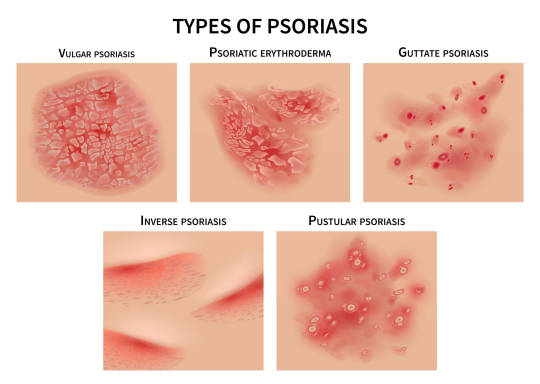
Introduction
World Psoriasis Day is a global event that shines a light on psoriasis, a chronic autoimmune condition that causes red, scaly patches to appear on the skin. It's an opportunity to educate and raise awareness about this often misunderstood disease. In this article, we'll delve into how endocannabinoids can regulate psoriasis, providing a unique perspective on the disease's underlying mechanisms.
Understanding Endocannabinoids
Endocannabinoids are naturally occurring compounds within our bodies that interact with the endocannabinoid system (ECS). The ECS is a complex cell-signalling system that plays a key role in regulating a range of functions and processes, including immune response, pain, mood, and more.
The two primary endocannabinoids are anandamide (AEA) and 2-arachidonoylglycerol (2-AG). These molecules bind to CB1 and CB2 receptors found throughout the body, triggering various physiological responses. Interestingly, research has indicated that these endocannabinoids and their receptors may play a significant role in managing skin health and diseases such as psoriasis.
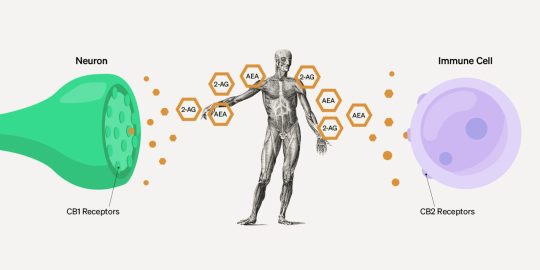
Endocannabinoids and Skin Health
Our skin is not just a barrier protecting us from the outside world; it's also a complex organ with its own ECS. This system plays a crucial role in maintaining skin homeostasis – the balance of cell growth and death. In conditions like psoriasis, this balance is disrupted, leading to an overproduction of skin cells.
Research has shown that endocannabinoids can influence several key aspects of skin health. They can regulate skin cell proliferation and differentiation, immune response, and inflammation - all critical factors in psoriasis.
Endocannabinoids and Psoriasis Regulation
Psoriasis is characterised by an overactive immune response, leading to inflammation and rapid skin cell growth. The role of endocannabinoids in psoriasis regulation primarily revolves around their anti-inflammatory and immunomodulatory properties.
Studies have shown that endocannabinoids can reduce inflammation by downregulating the production of pro-inflammatory cytokines, proteins that promote inflammation. This could potentially help manage the chronic inflammation seen in psoriasis.
Moreover, endocannabinoids can also modulate the immune response. They can inhibit the overactive immune cells responsible for the rapid skin cell growth in psoriasis, helping to restore balance in the skin's ecosystem.
Research also suggests that people with psoriasis may have an impaired endocannabinoid system, with lower levels of endocannabinoids in their skin. This could potentially contribute to the disease's development and progression, highlighting the potential therapeutic value of targeting this system.
Conclusion
While the relationship between endocannabinoids and psoriasis is complex and still not fully understood, current research indicates a promising role for these molecules in regulating the disease. By modulating inflammation and immune response, endocannabinoids could potentially help manage psoriasis symptoms and improve skin health.
However, it's important to note that more research is needed to fully understand the mechanisms involved and how best to harness the power of endocannabinoids for psoriasis treatment. As we celebrate World Psoriasis Day, let's also celebrate the ongoing research and advancements that bring us closer to understanding and effectively managing this challenging condition.
#psoriasisawareness#psoriasisawarenessmonth#psoriasis#psoriatic arthritis#cbd#endocannabinoidsystem#health#feelgreatagain#budandtender
4 notes
·
View notes
Text
The Uniqueness Of CBD
CBD is a phytocannabinoid that is a trapeno-phenolic molecule made of 21 carbon atoms, which is formed as a result of de-carboxylation (co² heating in the presence of oxygen) from the substance of origin – cannabigerolic acid (CBDA) and is not linked to the receptors of the CB1 or CB2 system but acts through a large number of other mechanisms of action that are recently revealed in the scientific study.
Cannabidiol does not cause intoxicating effects (non-Intoxicating) and does not feel the feeling of elation (High) in its effect at all. On the contrary, cannabidiol has a calming general effect, which prevents anxiety and psychosis while simultaneously suppressing inflammation throughout the body and soothing pain, nausea and vomiting.
3 notes
·
View notes
Text
Unlocking Nature’s Secret: How Beta-Caryophyllene Can Boost Your Wellness
In the search for natural wellness solutions, few compounds have drawn as much interest in recent years as beta-caryophyllene. Often overshadowed by more mainstream supplements, this remarkable terpene is steadily gaining recognition for its wide-ranging health benefits. Found in many plants—most notably in cannabis, black pepper, and cloves—beta-caryophyllene (BCP) is one of the most exciting natural wellness compounds available today.
So, what makes β-caryophyllene so unique? Unlike most other terpenes, beta-caryophyllene interacts directly with the body's endocannabinoid system, unlocking a host of potential wellness benefits. Whether you’re exploring the world of cannabis terpenes or looking for ways to naturally support your body’s equilibrium, understanding beta-caryophyllene could be your key to better health.
What is Beta-Caryophyllene (BCP)?

Beta-caryophyllene, also known as BCP, is a sesquiterpene that contributes to the spicy, woody aroma of certain herbs and spices. While it naturally occurs in basil, oregano, black pepper, cinnamon, and cloves, it’s most commonly associated with certain beta-caryophyllene strains of cannabis. These strains are prized not only for their aroma but also for their wellness-enhancing effects.
What truly sets beta-caryophyllene apart from other terpenes is its ability to bind to CB2 receptors in the body’s endocannabinoid system. These receptors are primarily involved in inflammation regulation, immune response, and pain perception. By activating CB2 receptors—without triggering the psychoactive effects linked to CB1—beta-caryophyllene can offer a natural, non-intoxicating path to wellness.
Top Beta-Caryophyllene Wellness Benefits
When it comes to wellness benefits of beta-caryophyllene, the list is impressive. This powerful terpene is being studied for its impact on several key areas of health:
1. Natural Anti-Inflammatory Support
Many people turn to beta-caryophyllene supplements to help combat chronic inflammation. Because it targets CB2 receptors, BCP can help the body naturally manage inflammatory responses—especially helpful for individuals dealing with arthritis or autoimmune conditions.
2. Pain Management
Among the most popular beta-caryophyllene effects is its potential to alleviate pain. Early research indicates that β-caryophyllene can offer analgesic benefits, making it a promising compound for those who prefer natural alternatives to synthetic painkillers.
3. Stress and Anxiety Relief
The endocannabinoid system plays a role in mood regulation, and BCP’s interaction with this system may contribute to lower stress levels and reduced anxiety. Many wellness seekers report feeling more emotionally balanced when incorporating beta-caryophyllene into their daily routines.
4. Digestive Health
Another one of the notable beta-caryophyllene wellness benefits involves gut health. With its anti-inflammatory properties, BCP may help soothe the digestive tract, improve microbiome balance, and reduce gastrointestinal discomfort.
5. Neuroprotective Effects
Some emerging studies suggest that beta-caryophyllene may also offer neuroprotective properties, possibly supporting brain health and cognitive function. While more research is needed, these findings are encouraging for those looking to support long-term mental clarity and neurological wellness.

How to Incorporate Beta-Caryophyllene Into Your Routine
If you're wondering how to add beta-caryophyllene to your wellness toolkit, the options are growing rapidly.
Beta-caryophyllene supplement capsules or softgels are now widely available. These deliver a concentrated dose and are easy to incorporate into your daily regimen.
Essential oils like clove or black pepper oil, which are rich in β-caryophyllene, can be used in aromatherapy or diluted for topical application.
Cannabis terpenes extracted from beta-caryophyllene strains can be found in tinctures, vapes, or edibles, offering a synergistic effect when combined with other cannabinoids and terpenes.
For optimal results, always choose products that list beta-caryophyllene content on their labels and ensure they come from reputable, lab-tested sources.
Beta-Caryophyllene Terpene Effects: What to Expect
Many users describe the effects of beta-caryophyllene as subtle yet effective. Unlike THC, it doesn’t produce a “high,” making it a great option for daytime use. Most people report feeling relaxed, less tense, and more physically comfortable after using BCP-rich products. Because it works directly with your body’s endocannabinoid system, the results are cumulative���meaning regular use can produce deeper benefits over time.
The Role of Beta-Caryophyllene in Cannabis Wellness
For those exploring cannabis terpenes, beta-caryophyllene offers a bridge between aromatherapy and targeted wellness. Certain beta-caryophyllene strains—like Bubba Kush, Girl Scout Cookies, and Sour Diesel—are high in BCP content and are sought after not just for their flavor but for their wellness potential.
Whether used on its own or in combination with other cannabinoids, BCP helps create the entourage effect, enhancing the therapeutic properties of the plant.
Conclusion: Is Beta-Caryophyllene Right for You?
As interest in natural health and plant-based therapies continues to rise, beta-caryophyllene is becoming a favorite among those looking to optimize their well-being. Its unique interaction with the endocannabinoid system, wide-ranging wellness benefits, and non-psychoactive nature make it a compelling option for those seeking holistic support.
Whether you’re new to the world of terpenes or an experienced wellness enthusiast, beta-caryophyllene deserves a place in your health journey. From supplements to cannabis strains, the pathways to experience BCP’s effects are diverse and increasingly accessible.
FAQs: Beta-Caryophyllene for Wellness
1. What is beta-caryophyllene and where does it come from?
Beta-caryophyllene (BCP) is a natural terpene found in various herbs and spices like black pepper, cloves, and cannabis. It’s unique for its ability to interact with CB2 receptors in the body, offering potential wellness benefits.
2. What are the main beta-caryophyllene wellness benefits?
BCP may help reduce inflammation, relieve pain, support stress management, enhance digestive health, and even protect brain function—all without causing psychoactive effects.
3. Are there beta-caryophyllene supplements available?
Yes, many wellness brands now offer beta-caryophyllene supplements in capsule or softgel form. Always choose third-party tested products to ensure purity and effectiveness.
4. What are the effects of beta-caryophyllene compared to other terpenes?
Unlike other terpenes, beta-caryophyllene binds to CB2 receptors in the endocannabinoid system, offering therapeutic effects without psychoactivity. This makes it especially valuable for users seeking targeted benefits.
5. Can I get beta-caryophyllene from cannabis?
Absolutely. Certain beta-caryophyllene strains of cannabis are rich in BCP. When used in full-spectrum products, BCP contributes to the entourage effect for enhanced wellness outcomes.
0 notes
Text
Green Street Origins CBD Gummies Best Offer?
➲➲➲ Sale Is Live At Official Website ➾➾ Hurry Up Visit NOW
╰┈➤ Product Name:⇢ Green Street Origins CBD Gummies
╰┈➤ Benefits:⇢ Anxiety, Pain and Stress
╰┈➤ Count:⇢ 30 Gummies(2 Gummies/Day)
╰┈➤ Rating:⇢★★★★★(5.0)
╰┈➤ Availability:⇢ In Stock Voted #1Product in the USA
Green Street Origins CBD Gummies Reviews: Anxiety and depression are common problems, especially among college students. As is trouble sleeping and a deterioration of mental health. We are expected to multitask more than ever before in today’s society. Every day, we are tasked with a wide range of mental and physical activities. A healthy existence requires both mental and physical fitness.
Green Street Origins CBD Gummies are typically made by infusing CBD oil into a gummy candy mixture. They come in various flavors, shapes, and concentrations, allowing users to choose a product that suits their preferences and dosage requirements. The dosages of CBD in gummies can vary widely, so it's important to read the product labels carefully to determine the amount of CBD in each gummy.
It's worth noting that while CBD is generally considered safe and well-tolerated, it can interact with certain medications and may have different effects on different individuals.
Additionally, regulations around CBD products can vary by location, so it's important to ensure that the Green Street Origins CBD Gummies you're purchasing come from a reputable source and adhere to legal and safety guidelines in your area. Always do your research and buy from trusted manufacturers.
➲➲➲ Sale Is Live At Official Website ➾➾ Hurry Up Visit NOW
What are Green Street Origins CBD Gummies?
Green Street Origins CBD Gummies are edible candies that contain cannabidiol (CBD) as one of their active ingredients. Unlike another well-known cannabinoid, tetrahydrocannabinol (THC), CBD is not psychoactive, meaning it doesn't cause the "high" sensation typically associated with cannabis use.
Green Street Origins CBD Gummies are a popular way to consume CBD because they provide a convenient and tasty method of ingestion. The gummies come in various shapes, sizes, flavors, and CBD concentrations, allowing users to choose products that suit their preferences and desired dosage.
➲➲➲ Sale Is Live At Official Website ➾➾ Hurry Up Visit NOW
How do Green Street Origins CBD Gummies Work?
These gummies typically contain CBD extract derived from hemp, which is a variety of cannabis with low levels of THC (tetrahydrocannabinol), the psychoactive compound responsible for the "high" associated with marijuana.
CBD Interaction with Endocannabinoid System (ECS): The human body has an endocannabinoid system (ECS) that plays a role in regulating various physiological processes, such as mood, pain sensation, immune response, and more. The ECS consists of cannabinoid receptors (CB1 and CB2) and endocannabinoids (naturally occurring compounds in the body). CBD interacts with these receptors, although its interaction is complex and not fully understood.
Non-Psychoactive Effects: Unlike THC, CBD does not produce a psychoactive "high." Instead, it's believed to have various potential therapeutic effects, such as reducing anxiety, alleviating pain, promoting relaxation, and potentially aiding in sleep.
Ingestion and Absorption: When you consume Green Street Origins CBD Gummies , the CBD is ingested along with the other ingredients in the gummy. The gummy is broken down in your digestive system, and the CBD is absorbed into your bloodstream through the walls of your stomach and intestines.
Metabolism: Once absorbed, CBD travels through your bloodstream to various tissues and organs. It may interact with different receptors and systems in the body, contributing to its potential effects.
➲➲➲ Sale Is Live At Official Website ➾➾ Hurry Up Visit NOW
How Green Street Origins CBD Gummies assist you with tension and stress?
Green Street Origins CBD Gummies 300mg may act as the potentially necessary arrangement to help you quiet your brain and body. It might speak with the receptors of the endocannabinoid framework and could reassure you and anxiety. It might assist you with accomplishing a tranquil state without of tiredness and disarray you might insight with different meds.
If you are encountering a hard day at work or are battling with bothersome contemplations, these chewy candies might work by assisting you with keeping a stable state of mind. It has pain-relieving properties that might help with diminishing the power of the aggravation you are persevering.
General Well-being: Some individuals take Green Street Origins CBD Gummies as part of their daily wellness routine, even if they don't have specific medical conditions, believing that it might contribute to overall well-being.
➲➲➲ Sale Is Live At Official Website ➾➾ Hurry Up Visit NOW
Benefits of taking Green Street Origins CBD Gummies:
Green Street Origins CBD Gummies are marketed as a product containing CBD (cannabidiol), a non-psychoactive compound derived from the cannabis plant. While I can provide you with potential benefits that are commonly associated with CBD products, please note that individual experiences may vary and scientific research is still ongoing to fully understand the range of effects and their effectiveness. Here are some potential benefits of taking Green Street Origins CBD Gummies:
Pain Management: CBD is believed to have anti-inflammatory properties and might help in managing pain by interacting with the endocannabinoid system, which plays a role in pain perception.
Anxiety and Stress Relief: Some people use CBD to help manage symptoms of anxiety and stress. It's thought to affect serotonin receptors, which are related to mood regulation.
Sleep Aid: CBD might help improve sleep quality by promoting relaxation and reducing anxiety, although the effects can vary from person to person.
Anti-Inflammatory Effects: CBD's anti-inflammatory properties could make it beneficial for conditions where inflammation plays a role, such as arthritis or inflammatory skin conditions.
Epilepsy Treatment: Epidiolex, a CBD-based medication, has been approved by the FDA to treat certain rare forms of epilepsy, indicating the potential of CBD in seizure management.
Neuroprotective Properties: Some studies suggest that CBD might have neuroprotective effects, potentially benefiting conditions like Parkinson's disease or multiple sclerosis.
Antioxidant Benefits: CBD's antioxidant properties might help protect cells from damage caused by free radicals, contributing to overall well-being.
Skin Health: CBD-infused products are used in skincare for their potential anti-inflammatory and soothing effects on conditions like acne or eczema.
Substance Abuse Treatment: There's some research suggesting that CBD might help individuals with substance abuse disorders by reducing drug cravings and withdrawal symptoms.
Heart Health: While more research is needed, CBD might have cardiovascular benefits due to its potential to lower blood pressure and reduce stress and anxiety.
Potential for Mental Health Disorders: CBD could potentially aid in managing conditions like depression, post-traumatic stress disorder (PTSD), and other mental health issues, although more research is required in this area.
➲➲➲ Sale Is Live At Official Website ➾➾ Hurry Up Visit NOW
What are the ingredients of Green Street Origins CBD Gummies?
The exact ingredients in Green Street Origins CBD Gummies can vary depending on the brand and formulation, but here are the common components you might find in typical Green Street Origins CBD Gummies :CBD Isolate or Full-Spectrum CBD Oil: This is the primary active ingredient in Green Street Origins CBD Gummies. It's either pure CBD isolate or a full-spectrum CBD oil extract, which contains a range of cannabinoids, terpenes, and other beneficial compounds from the cannabis plant.
Sweeteners: Gummies are known for their sweet and chewy nature, so they often contain various sweeteners to enhance their taste. Common sweeteners include sugar, corn syrup, and fruit juice concentrates. Some brands may use natural sweeteners like agave syrup or stevia.
Flavorings: To give gummies their distinct flavors, manufacturers add flavorings. These can be natural or artificial flavorings. Common flavors include fruity options like berry, citrus, and tropical fruit.
Gelatin or Pectin: Gelatin is traditionally used to give gummies their chewy texture. However, some gummies use pectin instead, making them suitable for vegetarians and vegans.
Colorings: Artificial or natural colorings are often used to give the gummies their vibrant and appealing colors.
Citric Acid: This is sometimes added to give a sour or tart flavor to the gummies.
Coating or Dusting: Some gummies are coated with a fine layer of sugar or sour powder to enhance the taste and texture.
Other Additives: Depending on the brand and formulation, additional ingredients might be included, such as vitamins, minerals, melatonin (for sleep), or other herbal extracts.
It's important to note that the quality and composition of Green Street Origins CBD Gummies can vary widely among different manufacturers. When choosing Green Street Origins CBD Gummies, it's a good idea to read the ingredient list, check the CBD content per gummy, and look for third-party lab testing results to ensure that.
➲➲➲ Sale Is Live At Official Website ➾➾ Hurry Up Visit NOW
How to use Green Street Origins CBD Gummies?
CBD (cannabidiol) gummies are a popular way to consume CBD, a compound derived from the cannabis plant that is known for its potential therapeutic benefits. Here's how you can use Green Street Origins CBD Gummies effectively:
Dosage: Before you start using Green Street Origins CBD Gummies , it's important to determine the right dosage for you. The appropriate dosage can vary depending on factors such as your body weight, metabolism, the concentration of CBD in each gummy, and the desired effects. It's recommended to start with a low dosage and gradually increase it until you find the optimal dose that works for you.
Start Slowly: If you're new to CBD, start with a lower dosage, such as one gummy. Observe how your body responds over the next few hours before considering taking more. The effects of CBD can take time to manifest, so be patient.
Consistency: For consistent results, try to take Green Street Origins CBD Gummies around the same time each day. This can help your body establish a routine and make it easier to gauge the effects.
Effects and Duration: Green Street Origins CBD Gummies typically take longer to take effect compared to methods like vaping, as they need to be digested first. It might take anywhere from 30 minutes to a couple of hours for you to feel the effects. The duration of the effects can vary, usually lasting around 4 to 6 hours.
Stay Hydrated: Drinking water can help enhance the absorption of CBD and support overall wellness.
Follow the manufacturer's recommendations for storage to ensure the gummies maintain their potency.
Effects and Feedback: Pay attention to how your body responds to CBD. If you're not experiencing the desired effects at your current dosage, you might consider increasing it slightly over time. However, do so in small increments and be cautious not to exceed recommended dosages.
Quality Matters: Choose high-quality Green Street Origins CBD Gummies from reputable manufacturers. Look for products that have been third-party tested for quality, potency, and purity.
Effects Can Vary: Keep in mind that everyone's body is different, so the effects of CBD can vary. Some people may experience relaxation, stress relief, or improved sleep, while others might not notice significant effects.
➲➲➲ Sale Is Live At Official Website ➾➾ Hurry Up Visit NOW
Customer Reviews and Testimonials
Real-Life Experiences
Many users have shared their positive experiences with Green Street Origins CBD Gummies, citing improvements in various areas of their health and well-being. These testimonials serve as valuable insights into the potential benefits of CBD products.
Success Stories
From pain relief to better sleep, customers have reported a wide range of benefits from incorporating Green Street Origins CBD Gummies into their daily routine. These success stories highlight the transformative power of natural wellness solutions.
Where to buy Green Street Origins CBD Gummies?
As of my last knowledge update in September 2021, CBD products, including Green Street Origins CBD Gummies, can be purchased from a variety of sources, both online and in physical stores. Here are some common places where you might find Green Street Origins CBD Gummies only go for the actual Official Site.
➲➲➲ Sale Is Live At Official Website ➾➾ Hurry Up Visit NOW
Conclusion
Green Street Origins CBD Gummies offer a natural and convenient way to experience the benefits of CBD. With their premium quality, delicious taste, and positive customer feedback, they stand out as an excellent choice for anyone looking to support their health and well-being.
0 notes
Text
Cannabis for Women’s Health: Natural PMS and Menopause Relief for Hormonal Balance



Cannabis for Women’s Health: Natural PMS and Menopause Relief for Hormonal Balance
More than 80% of women experience menstrual pain, prompting many to seek natural alternatives beyond conventional pharmaceuticals.Enter cannabis—a plant gaining widespread recognition for its ability to support women’s unique health needs. From relieving PMS symptoms and cramps to aiding menopause and enhancing sexual wellness, cannabis is emerging as a powerful ally in feminine care.As legalization expands and stigma fades, more women worldwide are turning to cannabis as a holistic wellness tool, embracing its potential to nurture both body and mind.
The Expanding Market for Women’s Health
The U.S. women’s health market is projected to surpass $58 billion by 2030, with growing attention to conditions such as infertility, menopause, endometriosis, and osteoporosis.Once stigmatized, cannabis is now being recognized as a promising natural remedy, offering new hope to millions seeking alternatives beyond traditional pharmaceuticals.
Cannabis: A Time-Tested Remedy for Women
Women have relied on cannabis for wellness for thousands of years. Ancient Mesopotamian texts, Egyptian papyri, and even Queen Victoria’s physician documented its use for easing menstrual discomfort and assisting childbirth.Now, modern science is validating these historical remedies, reaffirming cannabis’s potential in addressing women’s unique health concerns.


Understanding the Endocannabinoid System (ECS) and Women’s Health

What Is the ECS?The Endocannabinoid System (ECS) is a vital regulatory network that helps maintain internal balance, influencing processes such as:- Mood and stress response - Pain perception - Appetite and digestion - Sleep cycles - Immune function - Reproductive health - Endocannabinoids: Naturally occurring molecules that bind to cannabinoid receptors to trigger ECS responses. - Cannabinoid Receptors: Found throughout the body, especially in areas critical to women’s health. CB1 receptors are located in the brain and nervous system, while CB2 receptors are found in the immune system and reproductive organs. - Enzymes: Responsible for breaking down endocannabinoids after they’ve fulfilled their function.Since the ECS regulates many aspects of female wellness, cannabis-based therapies are increasingly seen as a promising approach.
How Cannabinoids Interact with the ECS
Plant-derived cannabinoids, particularly THC and CBD, interact with the body's endocannabinoid system (ECS) in distinct ways, influencing various physiological processes related to women's health.THC: The MimicTetrahydrocannabinol (THC) closely resembles the structure of anandamide, a naturally occurring endocannabinoid. This similarity allows THC to bind directly to CB1 and CB2 receptors, particularly in the brain and reproductive system, potentially impacting:- Pain relief - Mood regulation - Ovulation - Uterine contractions - Inhibit enzymes that break down anandamide, thereby increasing endocannabinoid levels. - Reduce inflammation and pain by modulating immune responses. - Support hormonal balance by interacting with serotonin receptors and anxiety-related pathways.Together, these cannabinoids offer promising relief for menstrual discomfort, PMS-related mood swings, anxiety, and inflammation, helping women feel more in control of their wellness.



Cannabis for Period Pain, PMS, and Endometriosis
Menstrual pain (dysmenorrhea) affects nearly 84% of women, yet research on cannabis as a period pain remedy remains limited. However, growing evidence and personal experiences suggest that cannabis-infused tampons, suppositories, and topicals may provide targeted relief, helping to ease cramps, reduce inflammation, and improve overall comfort.💬 “I started using a CBD vaginal suppository during my period, and it cut my cramps in half,” shares Emma, 32, from California.How Cannabis Helps PMS SymptomsMany women turn to cannabis for relief from common PMS symptoms, including:- Irritability and mood swings - Fatigue and low energy - Insomnia and restless sleep - Bloating and crampsA 2022 review in Frontiers in Psychiatry highlighted cannabinoids' potential in mood regulation, suggesting they could serve as a natural alternative to NSAIDs or hormone therapies for managing PMS discomfort.Endometriosis and Cannabis: A Promising AlternativeEndometriosis affects 1 in 10 women of reproductive age, causing severe pain and gastrointestinal issues.A 2020 study in PLOS One found that inhaled and oral cannabis significantly reduced endometriosis-related discomfort, providing a potential avenue for natural relief.


Supporting Menopause and Hormonal Balance
As estrogen levels decline, many women experience disruptive symptoms such as hot flashes, mood swings, joint pain, and insomnia. While traditional treatments exist, an increasing number of women are turning to cannabis as a natural alternative for relief.A 2020 survey published in Menopause found that most women who used cannabis for menopause reported improved sleep and reduced anxiety—a promising sign for those seeking holistic solutions.Although further research is needed, early findings and personal experiences suggest cannabis may offer meaningful relief. If you're considering cannabis for menopause, it's best to start with a low dose, monitor your body's response, and consult a healthcare provider familiar with cannabis-based therapies to ensure a safe and effective approach. Correlated Articol:

How Cannabis Helps Women Overcome Symptoms Of Menopause
How Cannabis Is Helping Women Reclaim Intimacy
Cannabis is transforming female sexual health by:- Reducing anxiety - Boosting natural lubrication - Intensifying orgasmsCannabis-infused lubricants and arousal oils are gaining popularity as tools to improve confidence, comfort, and pleasure.

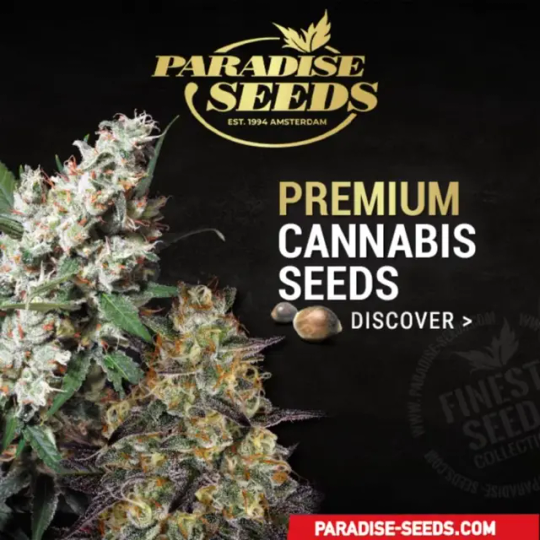
Cannabis Use During Pregnancy and Postpartum: What You Should Know

Pregnancy: A Complex ConsiderationWhile some women explore cannabis for relief from morning sickness, anxiety, or pain during pregnancy, health experts strongly advise caution. Research indicates that THC may affect fetal development, potentially leading to low birth weight and other complications.Organizations such as the CDC and FDA recommend that pregnant individuals avoid cannabis altogether due to the uncertain long-term effects on developing babies. Correlated Articol:
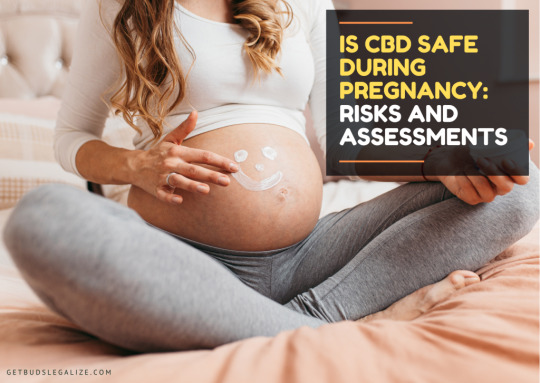
Is CBD Safe During Pregnancy? Risks And AssessmentsBreastfeeding and Postpartum RecoveryCannabinoids, including THC and CBD, can pass into breast milk, which raises concerns about potential effects on newborns. Read the full article
#CANNABIS#cannabisandmentalhealth#CannabisEducation#Cannabisforpainrelief#CannabisforWomen’sHealth#CBDbenefits#EndocannabinoidSystem#HolisticWellness#HormonalBalance#MEDICALCANNABIS#MenopauseSupport#NaturalRemediesforWomen#PMSRelief#ReproductiveHealth#THCandWomen’sHealth
0 notes
Text
Cannabis in the Kitchen: Tips for Cooking with Weed
Cooking with cannabis transforms the kitchen into a space for wellness and creativity, allowing users to craft infused dishes that deliver therapeutic benefits like pain relief, relaxation, or mood enhancement. In 2025, cannabis-infused cuisine is a growing trend, fueled by precise dosing and accessible products like Green Releaf’s oOYes Tincture. Whether you’re a novice or seasoned chef, mastering cannabis cooking requires understanding infusion techniques, strain selection, and safety protocols. This guide provides practical tips, recipes, and insights for incorporating cannabis into your culinary repertoire, optimized for users in regions like Columbia, MO, or Dayton, OH, with access to Green Releaf Dispensary’s offerings.
The Science of Cannabis-Infused Cooking
Cannabis delivers its effects through the endocannabinoid system (ECS), modulating pain, mood, and appetite via cannabinoid receptors (CB1, CB2). Tetrahydrocannabinol (THC) produces euphoria and relaxation, while cannabidiol (CBD) reduces anxiety and inflammation without psychoactivity. In edibles, cannabinoids are absorbed through digestion, undergoing first-pass metabolism in the liver to form 11-hydroxy-THC, a potent, long-lasting compound. Research from 2024 shows edibles provide effects lasting 6-8 hours (onset 1-2 hours), ideal for sustained relief. Terpenes, such as myrcene (sedating) or limonene (uplifting), enhance flavor and effects, aligning with prior discussions on strain-specific benefits.
Choosing Cannabis for Cooking
Selecting the right cannabis product is critical for successful infusion. Dispensary-sourced tinctures, oils, or edibles like oOYes Tincture ensure precise dosing and compliance with Ohio’s Medical Marijuana Control Program (MMCP), per your interest in Ohio regulations. Strains influence outcomes—Northern Lights (indica, myrcene-rich) promotes relaxation, Harlequin (CBD-dominant, linalool-rich) supports calm, and Blue Dream (hybrid, limonene-rich) uplifts mood. Decarboxylation, heating cannabis at 220-240°F for 30-40 minutes, activates THC and CBD for oral consumption, as raw cannabis is ineffective. A 2024 study confirms decarboxylated cannabis retains 90% potency, ensuring effective infusions.
Infusion Techniques
Cannabis is fat-soluble, requiring infusion into butter, oil, or alcohol for culinary use. Common methods include:
Cannabutter: Melt butter, add decarboxylated cannabis (1 gram per ½ cup butter), and simmer at 160-200°F for 2-3 hours, straining through cheesecloth. Yields ~50 mg THC per tablespoon for a 10% THC strain.
Canna-Oil: Combine olive or coconut oil with decarboxylated cannabis, heat at 160-200°F for 2-3 hours, and strain. Suitable for savory dishes, yielding similar potency.
Tincture Infusion: Use pre-made tinctures like oOYes Tincture for direct addition to recipes, offering precise dosing (e.g., 10 mg CBD per dropper).
Infusions should be stored in airtight containers in the refrigerator, lasting up to two weeks, per 2024 safety guidelines.
Safe Dosing and Consumption
Precise dosing prevents overconsumption, which can cause anxiety or sedation. Beginners should start with 2-5 mg THC or 10-20 mg CBD per serving, as 2024 data indicates 10 mg THC induces side effects in 30% of novices. Calculate potency by dividing total THC (e.g., 100 mg in 1 cup cannabutter) by servings (e.g., 16 tablespoons = 6.25 mg THC per tablespoon). Wait 2 hours for full onset before redosing. Effects should be logged, noting dosage, recipe, and outcome (e.g., “5 mg THC cookie, relaxed mood”). Consult a healthcare provider for medication interactions, especially for MMCP patients. Label infused dishes clearly and store securely to comply with Ohio regulations, verified as of May 27, 2025.
Cooking Tips and Recipe Ideas
Green Releaf’s products and practical tips for cannabis cooking:
Tip 1: Use oOYes Tincture for precise dosing in liquids or dressings, avoiding heat degradation, per April 17, 2025, inquiry.
Tip 2: Pair strains with flavors—Blue Dream (limonene) for citrus desserts, Northern Lights (myrcene) for savory dishes.
Tip 3: Test potency with small batches, starting with 1-2 mg THC per serving, to ensure consistent effects.
Recipe: Cannabis-Infused Lemon Vinaigrette Ingredients: ¼ cup olive oil, 2 tbsp lemon juice, 1 tsp Dijon mustard, 1 dropper oOYes Tincture (10 mg CBD), salt, pepper. Instructions: Whisk ingredients until emulsified. Drizzle over salads. Yield: 4 servings, ~2.5 mg CBD each, for calm and focus.
Recipe: Cannabis-Infused Brownie Bites Ingredients: ½ cup cannabutter (50 mg THC total), ¾ cup sugar, ½ cup flour, ¼ cup cocoa, 1 egg, 1 tsp vanilla. Instructions: Mix ingredients, pour into mini muffin tin, bake at 350°F for 15 minutes. Yield: 10 bites, ~5 mg THC each, for relaxation.
Legal and Safety Considerations
Ohio’s MMCP permits medical patients to purchase cannabis for infusion but prohibits personal cultivation, per your interest in Ohio’s regulations. Use dispensary-sourced products like oOYes Tincture or strawberry white chocolate bar to ensure compliance. Homemade edibles must be consumed privately, as public use violates state law. Avoid serving to minors or unaware guests, and store in child-proof containers. Overconsumption risks are mitigated by starting low and consulting Green Releaf staff in Columbia or Dayton for dosing advice. Cannabis may interact with medications like painkillers, requiring medical consultation.
Trends and Supporting Evidence
In 2025, cannabis cooking is a cultural phenomenon, with 2024 surveys showing 50% of cannabis users experimenting with home infusions, up from 35% in 2022. Precision dosing and gourmet recipes drive engagement, with 40% preferring tincture-based infusions, per industry reports. Online platforms report surging interest in #CannaCooking, with users praising Harlequin for daytime recipes and Northern Lights for evening dishes. Green Releaf’s oOYes Tincture and strawberry white chocolate bar align with these trends, offering reliable ingredients. Innovations like nano-emulsified tinctures, reducing onset to 15-30 minutes, enhance culinary applications in 2025.
Sourcing Cannabis for Cooking
Licensed dispensaries provide access to infusion products with transparent cannabinoid and terpene data, ensuring safety and efficacy. To source high-quality options, Experience the best cannabis shopping in dayton for cooking ingredients, available in Columbia or Dayton, as per your expressed interest.
Conclusion
Cooking with cannabis in 2025 empowers users to create personalized, therapeutic dishes with products like oOYes Tincture and strains like Northern Lights or Blue Dream. By mastering infusion, dosing, and strain selection, home chefs can craft recipes for relaxation, calm, or mood enhancement. With Green Releaf’s quality offerings and safe practices, cannabis elevates the kitchen into a space for wellness and creativity.
0 notes
Text
Marijuana Users Have More Empathy And A Greater Understanding Of Other People's Emotions, Study Finds
Researchers said the results suggest a potential association between cannabis use and empathy, though they caution that further research is needed to fully understand the interactions “since many other factors may be at play.”
In attempting to explain the findings, the team of neuroscientists noted that a part of the brain, the anterior cingulate cortex (ACC), “is a region that is prone to the effects of cannabis consumption and is also greatly involved in empathy, which is a multi-component process that can be influenced in different ways.”
“Given that the ACC is one of the main areas that possess CB1 [cannabinoid] receptors and is heavily involved in the representation of the affective state of others,” the study says, “we believe that the differences shown by regular cannabis users in the emotional comprehension scores and their brain functional connectivity could be related to the use of cannabis.”
Despite the qualifiers, the study concludes, “Given previous studies of the effect of cannabis on mood and emotional detection, we believe that these results contribute to open a pathway to study further the clinical applications of the positive effect that cannabis or cannabis components could have in affect and social interactions.”
In other neuroscience research this year, researchers at the University of West Attica in Greece found that medical marijuana use was associated with improved quality of life — including better job performance, sleep, appetite, and energy — among people with neurological disorders.
Another recent study published by the American Medical Association found that medical marijuana was associated with “significant improvements” in quality of life for people with conditions like chronic pain and insomnia—and those effects were “largely sustained” over time.
Other studies have found cannabis may boost the “runner's high” felt during exercise and enhance the practice of yoga.
#science!#i love research#I'm so happy they're allowed to study cannabis even more#lol weed#yay weed#the runner's high can be mimicked with cannabis i knew it
18 notes
·
View notes
Text
The Impact of Rabies on the Endocannabinoid System: Unraveling the Connection
World Rabies Day 28th September
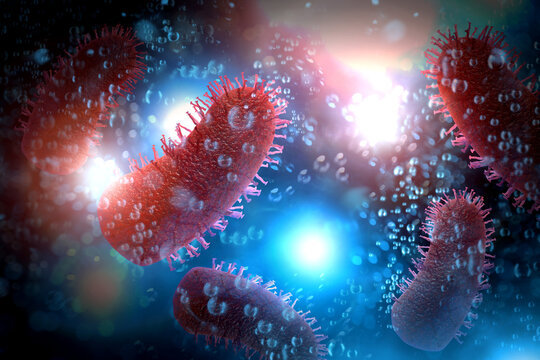
Introduction
Rabies, a deadly viral disease that affects the nervous system, has long been a cause for concern worldwide. While its effects on the central nervous system are well-documented, recent research has shed light on the impact of rabies on the endocannabinoid system. This article aims to explore this intriguing connection and understand how rabies affects the delicate balance of the endocannabinoid system.
Understanding Rabies
Rabies is primarily transmitted through the bite or scratch of an infected animal, typically dogs, bats, or other wildlife. Once the virus enters the body, it travels to the brain, causing inflammation and neurological symptoms. Rabies can be classified into two forms: furious rabies, characterized by aggressive behaviour, and paralytic rabies, which leads to muscle weakness and paralysis.
The Endocannabinoid System
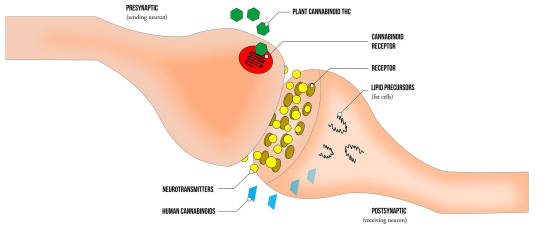
The endocannabinoid system (ECS) is a complex network of receptors, endocannabinoids, and enzymes that play a crucial role in maintaining homeostasis within the body. It regulates various physiological processes such as pain sensation, mood, appetite, and immune response. The ECS consists of two main receptors, CB1 and CB2, which are found throughout the body, including the brain.
Impact of Rabies on the Endocannabinoid System
Recent studies have indicated that rabies infection can disrupt the functioning of the endocannabinoid system. The virus affects the CB1 receptors in the brain, leading to altered neurotransmission and impaired signalling. This disruption may contribute to the behavioural changes observed in individuals infected with rabies, such as aggression and hyperactivity.
Inflammation and Immune Response
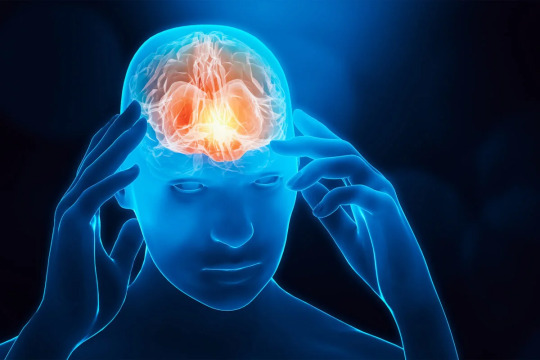
Rabies infection triggers a robust inflammatory response in the brain, leading to encephalitis. This inflammation can further impact the endocannabinoid system, as inflammatory mediators can interfere with the normal functioning of CB1 receptors. The dysregulation of the ECS due to inflammation may contribute to the neurological symptoms associated with rabies.
Conclusion
The connection between rabies and the endocannabinoid system highlights the intricate relationship between viral infections and the body's regulatory systems. While much remains to be discovered, studying the impact of rabies on the ECS may provide valuable insights into the development of novel treatment strategies. By unravelling this complex interplay, researchers can pave the way for improved outcomes for individuals affected by this devastating disease.
#rabies#rabies awareness#endocannabinoidsystem#endocannabinoids#cannabis#cbd#health#feelgreatagain#budandtender
2 notes
·
View notes
Text
What Is Organic THCA Flower? Benefits, Legality, and Usage
In recent years, the demand for cleaner, non-psychoactive cannabis products has risen sharply. Among the most sought-after options is organic THCA flower—a product known for its potential therapeutic benefits without causing a high. This guide explores what organic THCA flower is, how it differs from other cannabis forms, its possible health benefits, legal standing, and how to safely use it. Whether you're new to cannabis or an experienced user looking for a natural option, this article will provide the details you need.
Understanding THCA: The Non-Psychoactive Cannabinoid
THCA stands for Tetrahydrocannabinolic Acid, a naturally occurring compound found in raw and freshly harvested cannabis plants. Unlike THC (Tetrahydrocannabinol), which is known for its psychoactive effects, THCA does not produce a high when consumed in its raw form. When cannabis is heated—through smoking, vaping, or cooking—THCA converts to THC in a process called decarboxylation. This distinction is critical for users seeking the therapeutic qualities of cannabis without the mind-altering effects.
What Does Organic Mean in Cannabis Products?
When it comes to cannabis, "organic" isn't just a marketing term—it reflects how the plant is cultivated. Organic THCA flower is grown without the use of synthetic fertilizers, chemical pesticides, herbicides, or genetically modified organisms (GMOs). Organic growing practices promote healthy soil, clean water, and pesticide-free flower buds, resulting in a purer final product. While the USDA doesn’t officially certify cannabis in many regions, reputable growers often seek third-party certifications or provide lab test results verifying organic practices.
What Is Organic THCA Flower?
Organic THCA flower refers to cannabis flower harvested from organically grown plants that are high in THCA content. These flowers are typically hand-trimmed and tested for cannabinoid levels, ensuring quality and potency. They often feature dense trichomes, rich terpenes, and a strong aroma. Because the THCA has not yet been activated, the flower remains non-psychoactive until it is exposed to heat. This makes it ideal for those who want cannabis's potential health benefits without any mental impairment.
Health Benefits of Organic THCA Flower
Although research is still ongoing, organic THCA flower has shown promise in various wellness areas. Early studies suggest that THCA may have anti-inflammatory, neuroprotective, anti-nausea, and appetite-stimulating effects. Because THCA interacts with the body’s endocannabinoid system without binding directly to CB1 receptors like THC, it provides these benefits without causing intoxication. Users report using it for conditions such as arthritis, muscle spasms, and digestive issues. Choosing an organic version may also reduce the risk of consuming harmful chemical residues.
How to Use Organic THCA Flower
There are several ways to use organic THCA flower, depending on your goals. For raw consumption, many users add it to smoothies or juices to benefit from its non-psychoactive properties. To activate the THC for a stronger effect, the flower can be smoked, vaporized, or baked into edibles. When smoking or vaping, THCA is instantly converted to THC, resulting in a more traditional cannabis experience. Proper dosing is important, especially for beginners, to avoid unwanted effects from activated THC.
Is Organic THCA Flower Legal in the United States?
The legal status of organic THCA flower is complex and varies by jurisdiction. Under the 2018 Farm Bill, hemp-derived products are federally legal in the U.S. as long as they contain less than 0.3% Delta-9 THC by dry weight. However, THCA itself is not explicitly scheduled, creating a legal grey area. Some states treat THCA as a controlled substance once it is decarboxylated into THC. Therefore, it's essential to check your local laws before purchasing or using THCA flower, especially in states with strict cannabis regulations.
Where to Buy Organic THCA Flower
Consumers should be cautious when selecting where to purchase organic THCA flower. Look for vendors who provide Certificates of Analysis (COAs) from accredited third-party labs. These lab reports should confirm THCA content, the absence of pesticides and heavy metals, and terpene profiles. Reputable sellers often list their strains, growing methods, and lab results on their websites. Some well-known brands in the U.S. include Secret Nature, Greenhouse Hemp, and Wild Orchard, all of which focus on premium, organically grown cannabis flower.
Buyer Tips and Safety Guidelines
When purchasing or using organic THCA flower, safety should be a top priority. Always start with a low dose, especially if you're converting THCA to THC through heat. Store your flower in a cool, dry place away from sunlight to maintain freshness and potency. Avoid any product that lacks lab test results or clear sourcing information. While THCA is generally well-tolerated, consult a healthcare provider if you have underlying health conditions or are taking medications that might interact with cannabinoids.
Conclusion: A Natural Option with Promising Benefits
Organic THCA flower offers a cleaner, safer way to explore cannabis’s health potential. With its non-psychoactive profile and growing list of reported benefits, it appeals to a wide range of users—from those seeking relief from chronic pain to those looking for a natural dietary supplement. As long as you understand the legal and usage factors, organic THCA flower can be a valuable part of a wellness-focused lifestyle. Always prioritize lab-tested, ethically grown products to ensure safety and effectiveness.
0 notes
Text
Tranquil Vibe CBD Gummies (2025) 100% Safe, Does It Really Work!
Introduction For Tranquil Vibe CBD Gummies?
In today’s fast-paced world, finding peace of mind and relief from daily stress can be a challenge. Tranquil Vibe CBD Gummies have emerged as a powerful and natural solution for individuals looking to balance their mental and physical health. This article explores everything you need to know about Tranquil Vibe CBD Gummies, including benefits, ingredients, usage, safety, and where to buy them.
What Are Tranquil Vibe CBD Gummies?
Tranquil Vibe CBD Gummies are edible supplements infused with cannabidiol (CBD), a compound derived from the hemp plant. These gummies are designed to offer therapeutic benefits such as stress relief, anxiety reduction, improved sleep, and support for chronic pain — all without the psychoactive effects associated with THC.
Each gummy contains a consistent dose of CBD, making them easy to consume and convenient for daily use. Tranquil Vibe CBD Gummies are also non-habit forming and safe for regular consumption.
How Do Tranquil Vibe CBD Gummies Work?
CBD interacts with the body’s endocannabinoid system (ECS), which plays a key role in regulating mood, pain sensation, inflammation, and sleep. Tranquil Vibe CBD Gummies support the ECS by enhancing its ability to maintain balance and promote homeostasis.
When consumed, CBD binds with cannabinoid receptors (CB1 and CB2) located throughout the body and brain. This interaction can lead to a calming effect, making Tranquil Vibe CBD Gummies Reviews a popular choice for managing everyday stress and discomfort.
Key Benefits of Tranquil Vibe CBD Gummies
Here are the main advantages of incorporating Tranquil Vibe CBD Gummies into your wellness routine:
1. Stress and Anxiety Relief
One of the top reasons people turn to Tranquil Vibe CBD Gummies is their ability to reduce anxiety and manage stress. The calming effect of CBD helps promote a relaxed state of mind without sedation.
2. Improved Sleep Quality
Many users report better sleep after using Tranquil Vibe CBD Gummies, thanks to CBD’s natural influence on the sleep-wake cycle and its ability to calm a racing mind.
3. Pain and Inflammation Management
CBD is widely known for its anti-inflammatory and analgesic properties. Tranquil Vibe CBD Gummies may help with chronic conditions like arthritis, joint pain, or muscle soreness.
4. Enhanced Focus and Clarity
Rather than making you feel drowsy, Tranquil Vibe CBD Gummies can support mental clarity and improved concentration by calming distractions and mental noise.
5. Mood Stabilization
For those struggling with mood swings or mild depression, the consistent use of Tranquil Vibe CBD Gummies may contribute to a more stable emotional state.
Ingredients in Tranquil Vibe CBD Gummies
Each gummy is packed with carefully selected natural ingredients:
CBD Extract (Full Spectrum or Broad Spectrum)
Organic Tapioca Syrup
Natural Fruit Flavors (like Strawberry, Raspberry, or Citrus)
Pectin (Plant-Based Gelatin Alternative)
Cane Sugar
Citric Acid
Natural Colorants from Vegetables and Fruits
Importantly, Tranquil Vibe CBD Gummies are free from artificial chemicals, fillers, or additives. Many formulas are vegan and gluten-free, making them suitable for a wide range of dietary needs.
How to Use Tranquil Vibe CBD Gummies
To experience the full benefits of Tranquil Vibe CBD Gummies, consistent use is key. Here’s how to get started:
Start Low and Slow: Begin with 1 gummy per day (usually 10–25mg of CBD).
Adjust as Needed: Gradually increase the dose if desired effects are not achieved.
Daily Routine: Take the gummies at the same time each day — morning or night.
Stay Hydrated: Drinking water helps the absorption process.
Most users notice improvements within the first week, with more pronounced results appearing over several weeks of regular use.
Are Tranquil Vibe CBD Gummies Safe?
Yes, Tranquil Vibe CBD Gummies are generally considered safe for most adults. They contain no THC, meaning they won’t produce a “high” or show up on standard drug tests. However, you should consult with a healthcare provider if you:
Are pregnant or breastfeeding
Are taking prescription medications
Have a chronic health condition
Also, it's best to buy from reputable manufacturers who provide lab test results and ingredient transparency.
Order Now
Scientific Research on CBD and Its Effects
Numerous studies support the therapeutic benefits of CBD:
A 2019 study in The Permanente Journal showed that 79% of participants reported reduced anxiety after using CBD.
Research published in Frontiers in Neurology (2018) confirmed CBD’s anti-inflammatory and neuroprotective effects.
Sleep improvements with CBD were documented in studies evaluating patients with insomnia and PTSD.
Tranquil Vibe CBD Gummies leverage these findings, offering a consumer-friendly form of this powerful compound.
Who Should Use Tranquil Vibe CBD Gummies?
These gummies are ideal for:
Adults experiencing stress or anxiety
Individuals suffering from chronic pain or inflammation
Those struggling with poor sleep or restlessness
Professionals seeking improved focus and balance
Fitness enthusiasts dealing with post-workout soreness
However, they are not recommended for children unless prescribed by a doctor.
Real User Reviews of Tranquil Vibe CBD Gummies
“I’ve tried a lot of CBD products, but Tranquil Vibe CBD Gummies are by far the best. I sleep like a baby now.” – Melissa R.
“These gummies help me stay calm during work presentations. Highly recommend!” – Jason L.
“I had joint pain for years. After a month on Tranquil Vibe CBD Gummies, I can walk without limping. Game changer!” – Hannah M.
Frequently Asked Questions
How long does it take for Tranquil Vibe CBD Gummies to work?
Effects typically start within 30–60 minutes after consumption, depending on your metabolism and body weight.
Will Tranquil Vibe CBD Gummies make me high?
No. They contain zero or negligible THC and are non-psychoactive.
Can I take them with other medications?
Always check with your doctor, especially if you’re on medications that affect the liver or brain.
Where to Buy Tranquil Vibe CBD Gummies
It is recommended to purchase directly from the official website or authorized retailers to avoid counterfeit products. Many vendors offer:
Free shipping
Money-back guarantees
Bundle discounts
Beware of fake listings or non-certified third-party sellers.
Final Thoughts on Tranquil Vibe CBD Gummies
In a world full of stress, sleepless nights, and chronic discomfort, Tranquil Vibe CBD Gummies offer a natural and accessible path to better health. With high-quality ingredients, lab-tested formulas, and thousands of happy customers, this supplement continues to gain popularity for good reason.
If you're looking for a safe, effective, and tasty way to boost your overall wellness, Tranquil Vibe CBD Gummies may be the perfect solution.
Visit Hare To Official Website>
https://tranquilcbdgummies.com/
#TranquilVibeCBDGummies
#TranquilVibeCBDGummiesReview
#TranquilVibeCBDGummiesReviews
#TranquilVibeCBDGummiesWhereToBuy
#TranquilVibeCBDGummiesReviewsPrice
0 notes
Text
How Pet CBD Helps Improve Your Pet’s Health Naturally

In recent years, Pet CBD has become a powerful tool in the hands of caring pet owners looking to support their pets' health using natural remedies. As more scientific research validates the benefits of cannabidiol (CBD), it is no longer a niche trend but a growing movement in holistic pet care. From easing anxiety to supporting joint health, Pet CBD is making a real difference in the lives of dogs, cats, and even smaller animals.
But what exactly is Pet CBD, and how can it benefit your beloved companion? Let’s explore the science, the benefits, and how you can use it safely and effectively.
What Is Pet CBD?
CBD, or cannabidiol, is a compound derived from the hemp plant. Unlike THC (tetrahydrocannabinol), CBD is non-psychoactive, meaning it does not cause a "high." Pet CBD products are specially formulated for animals, often with pet-safe concentrations and ingredients.
Most commonly, Pet CBD is available in:
Tinctures and oils
Soft chews or treats
Topical creams
Capsules
These products are designed to support a wide range of physical and emotional wellness concerns in pets.
The Science Behind Pet CBD
All mammals—including dogs and cats—have an endocannabinoid system (ECS). This system plays a critical role in regulating bodily functions such as mood, pain perception, appetite, inflammation, and sleep.
CBD interacts with ECS receptors (primarily CB1 and CB2) to help maintain balance, or homeostasis, in the body. This is why CBD can have such a wide-reaching impact on your pet’s health.
Proven Health Benefits of Pet CBD
1. Reduces Anxiety and Stress
Is your dog terrified of thunderstorms or fireworks? Does your cat get anxious during car rides or vet visits?
Pet CBD has calming effects that help reduce anxiety-related behaviors without sedation. Many pet owners report that CBD helps their pets remain calm in stressful situations, improving their quality of life.
2. Supports Joint and Mobility Health
Arthritis and joint pain are common, especially in older dogs and cats. CBD has anti-inflammatory properties that may reduce swelling and discomfort, promoting better mobility.
Case Example: Bella, a 10-year-old Golden Retriever, struggled to get up stairs due to arthritis. After a month of daily CBD oil, her owner noticed improved movement and less stiffness.
3. Eases Chronic Pain
CBD may act as a natural pain reliever by influencing pain receptors in the nervous system. This makes it a helpful addition to traditional treatment plans for chronic conditions.
4. Improves Appetite and Digestion
CBD can stimulate appetite and ease nausea. This is particularly useful for pets undergoing medical treatments like chemotherapy or suffering from gastrointestinal issues.
5. Enhances Overall Wellness
CBD can also be used as a preventative supplement, supporting immune health, sleep quality, and overall mood. Some owners use it as part of a daily wellness routine for their pets.
How to Use Pet CBD Safely
While CBD is generally considered safe, especially when sourced from reputable companies, it's important to take the following steps:
✔ Choose Quality Products
Look for lab-tested, THC-free, and organically sourced CBD.
Avoid human CBD products—they may contain ingredients harmful to pets.
✔ Start Low and Go Slow
Begin with the lowest recommended dose.
Monitor your pet’s response over a few days, then adjust as needed.
✔ Consult Your Veterinarian
Before introducing Pet CBD, speak with your veterinarian—especially if your pet is on other medications. CBD can interact with certain drugs.
Signs That Pet CBD May Be Helping
You might notice:
A calmer demeanor during stressful events
Increased mobility or willingness to play
A healthier appetite
Reduced signs of pain or discomfort
Is Pet CBD Legal and Safe?
Yes, Pet CBD derived from hemp (with less than 0.3% THC) is legal in most regions, including the U.S., Canada, and many European countries. As long as it’s from a licensed manufacturer and third-party tested, it’s considered safe for pets.
However, avoid any products with high THC levels, as THC can be toxic to animals.
Final Thoughts
Pet CBD is more than a wellness trend—it's a scientifically backed, naturally derived supplement that’s helping pets live better lives. Whether your dog is anxious during storms or your senior cat is dealing with arthritis, CBD may offer the gentle support they need.
By choosing high-quality products, following proper dosage, and working with your vet, you can enhance your pet’s health naturally and lovingly.
Your pet gives you unconditional love—CBD is one way to give a little comfort in return.
0 notes
Text
Green Street Origins CBD Gummies: Real Benefits and Side Effects?
➲➲➲ Sale Is Live At Official Website ➾➾ Hurry Up Visit NOW
╰┈➤ Product Name:⇢ Green Street Origins CBD Gummies
╰┈➤ Benefits:⇢ Anxiety, Pain and Stress
╰┈➤ Count:⇢ 30 Gummies(2 Gummies/Day)
╰┈➤ Rating:⇢★★★★★(5.0)
╰┈➤ Availability:⇢ In Stock Voted #1Product in the USA
Green Street Origins CBD Gummies Reviews: Anxiety and depression are common problems, especially among college students. As is trouble sleeping and a deterioration of mental health. We are expected to multitask more than ever before in today’s society. Every day, we are tasked with a wide range of mental and physical activities. A healthy existence requires both mental and physical fitness.
Green Street Origins CBD Gummies are typically made by infusing CBD oil into a gummy candy mixture. They come in various flavors, shapes, and concentrations, allowing users to choose a product that suits their preferences and dosage requirements. The dosages of CBD in gummies can vary widely, so it's important to read the product labels carefully to determine the amount of CBD in each gummy.
It's worth noting that while CBD is generally considered safe and well-tolerated, it can interact with certain medications and may have different effects on different individuals.
Additionally, regulations around CBD products can vary by location, so it's important to ensure that the Green Street Origins CBD Gummies you're purchasing come from a reputable source and adhere to legal and safety guidelines in your area. Always do your research and buy from trusted manufacturers.
➲➲➲ Sale Is Live At Official Website ➾➾ Hurry Up Visit NOW
What are Green Street Origins CBD Gummies?
Green Street Origins CBD Gummies are edible candies that contain cannabidiol (CBD) as one of their active ingredients. Unlike another well-known cannabinoid, tetrahydrocannabinol (THC), CBD is not psychoactive, meaning it doesn't cause the "high" sensation typically associated with cannabis use.
Green Street Origins CBD Gummies are a popular way to consume CBD because they provide a convenient and tasty method of ingestion. The gummies come in various shapes, sizes, flavors, and CBD concentrations, allowing users to choose products that suit their preferences and desired dosage.
➲➲➲ Sale Is Live At Official Website ➾➾ Hurry Up Visit NOW
How do Green Street Origins CBD Gummies Work?
These gummies typically contain CBD extract derived from hemp, which is a variety of cannabis with low levels of THC (tetrahydrocannabinol), the psychoactive compound responsible for the "high" associated with marijuana.
CBD Interaction with Endocannabinoid System (ECS): The human body has an endocannabinoid system (ECS) that plays a role in regulating various physiological processes, such as mood, pain sensation, immune response, and more. The ECS consists of cannabinoid receptors (CB1 and CB2) and endocannabinoids (naturally occurring compounds in the body). CBD interacts with these receptors, although its interaction is complex and not fully understood.
Non-Psychoactive Effects: Unlike THC, CBD does not produce a psychoactive "high." Instead, it's believed to have various potential therapeutic effects, such as reducing anxiety, alleviating pain, promoting relaxation, and potentially aiding in sleep.
Ingestion and Absorption: When you consume Green Street Origins CBD Gummies , the CBD is ingested along with the other ingredients in the gummy. The gummy is broken down in your digestive system, and the CBD is absorbed into your bloodstream through the walls of your stomach and intestines.
Metabolism: Once absorbed, CBD travels through your bloodstream to various tissues and organs. It may interact with different receptors and systems in the body, contributing to its potential effects.
➲➲➲ Sale Is Live At Official Website ➾➾ Hurry Up Visit NOW
How Green Street Origins CBD Gummies assist you with tension and stress?
Green Street Origins CBD Gummies 300mg may act as the potentially necessary arrangement to help you quiet your brain and body. It might speak with the receptors of the endocannabinoid framework and could reassure you and anxiety. It might assist you with accomplishing a tranquil state without of tiredness and disarray you might insight with different meds.
If you are encountering a hard day at work or are battling with bothersome contemplations, these chewy candies might work by assisting you with keeping a stable state of mind. It has pain-relieving properties that might help with diminishing the power of the aggravation you are persevering.
General Well-being: Some individuals take Green Street Origins CBD Gummies as part of their daily wellness routine, even if they don't have specific medical conditions, believing that it might contribute to overall well-being.
➲➲➲ Sale Is Live At Official Website ➾➾ Hurry Up Visit NOW
Benefits of taking Green Street Origins CBD Gummies:
Green Street Origins CBD Gummies are marketed as a product containing CBD (cannabidiol), a non-psychoactive compound derived from the cannabis plant. While I can provide you with potential benefits that are commonly associated with CBD products, please note that individual experiences may vary and scientific research is still ongoing to fully understand the range of effects and their effectiveness. Here are some potential benefits of taking Green Street Origins CBD Gummies:
Pain Management: CBD is believed to have anti-inflammatory properties and might help in managing pain by interacting with the endocannabinoid system, which plays a role in pain perception.
Anxiety and Stress Relief: Some people use CBD to help manage symptoms of anxiety and stress. It's thought to affect serotonin receptors, which are related to mood regulation.
Sleep Aid: CBD might help improve sleep quality by promoting relaxation and reducing anxiety, although the effects can vary from person to person.
Anti-Inflammatory Effects: CBD's anti-inflammatory properties could make it beneficial for conditions where inflammation plays a role, such as arthritis or inflammatory skin conditions.
Epilepsy Treatment: Epidiolex, a CBD-based medication, has been approved by the FDA to treat certain rare forms of epilepsy, indicating the potential of CBD in seizure management.
Neuroprotective Properties: Some studies suggest that CBD might have neuroprotective effects, potentially benefiting conditions like Parkinson's disease or multiple sclerosis.
Antioxidant Benefits: CBD's antioxidant properties might help protect cells from damage caused by free radicals, contributing to overall well-being.
Skin Health: CBD-infused products are used in skincare for their potential anti-inflammatory and soothing effects on conditions like acne or eczema.
Substance Abuse Treatment: There's some research suggesting that CBD might help individuals with substance abuse disorders by reducing drug cravings and withdrawal symptoms.
Heart Health: While more research is needed, CBD might have cardiovascular benefits due to its potential to lower blood pressure and reduce stress and anxiety.
Potential for Mental Health Disorders: CBD could potentially aid in managing conditions like depression, post-traumatic stress disorder (PTSD), and other mental health issues, although more research is required in this area.
➲➲➲ Sale Is Live At Official Website ➾➾ Hurry Up Visit NOW
What are the ingredients of Green Street Origins CBD Gummies?
The exact ingredients in Green Street Origins CBD Gummies can vary depending on the brand and formulation, but here are the common components you might find in typical Green Street Origins CBD Gummies :CBD Isolate or Full-Spectrum CBD Oil: This is the primary active ingredient in Green Street Origins CBD Gummies. It's either pure CBD isolate or a full-spectrum CBD oil extract, which contains a range of cannabinoids, terpenes, and other beneficial compounds from the cannabis plant.
Sweeteners: Gummies are known for their sweet and chewy nature, so they often contain various sweeteners to enhance their taste. Common sweeteners include sugar, corn syrup, and fruit juice concentrates. Some brands may use natural sweeteners like agave syrup or stevia.
Flavorings: To give gummies their distinct flavors, manufacturers add flavorings. These can be natural or artificial flavorings. Common flavors include fruity options like berry, citrus, and tropical fruit.
Gelatin or Pectin: Gelatin is traditionally used to give gummies their chewy texture. However, some gummies use pectin instead, making them suitable for vegetarians and vegans.
Colorings: Artificial or natural colorings are often used to give the gummies their vibrant and appealing colors.
Citric Acid: This is sometimes added to give a sour or tart flavor to the gummies.
Coating or Dusting: Some gummies are coated with a fine layer of sugar or sour powder to enhance the taste and texture.
Other Additives: Depending on the brand and formulation, additional ingredients might be included, such as vitamins, minerals, melatonin (for sleep), or other herbal extracts.
It's important to note that the quality and composition of Green Street Origins CBD Gummies can vary widely among different manufacturers. When choosing Green Street Origins CBD Gummies, it's a good idea to read the ingredient list, check the CBD content per gummy, and look for third-party lab testing results to ensure that.
➲➲➲ Sale Is Live At Official Website ➾➾ Hurry Up Visit NOW
How to use Green Street Origins CBD Gummies?
CBD (cannabidiol) gummies are a popular way to consume CBD, a compound derived from the cannabis plant that is known for its potential therapeutic benefits. Here's how you can use Green Street Origins CBD Gummies effectively:
Dosage: Before you start using Green Street Origins CBD Gummies , it's important to determine the right dosage for you. The appropriate dosage can vary depending on factors such as your body weight, metabolism, the concentration of CBD in each gummy, and the desired effects. It's recommended to start with a low dosage and gradually increase it until you find the optimal dose that works for you.
Start Slowly: If you're new to CBD, start with a lower dosage, such as one gummy. Observe how your body responds over the next few hours before considering taking more. The effects of CBD can take time to manifest, so be patient.
Consistency: For consistent results, try to take Green Street Origins CBD Gummies around the same time each day. This can help your body establish a routine and make it easier to gauge the effects.
Effects and Duration: Green Street Origins CBD Gummies typically take longer to take effect compared to methods like vaping, as they need to be digested first. It might take anywhere from 30 minutes to a couple of hours for you to feel the effects. The duration of the effects can vary, usually lasting around 4 to 6 hours.
Stay Hydrated: Drinking water can help enhance the absorption of CBD and support overall wellness.
Follow the manufacturer's recommendations for storage to ensure the gummies maintain their potency.
Effects and Feedback: Pay attention to how your body responds to CBD. If you're not experiencing the desired effects at your current dosage, you might consider increasing it slightly over time. However, do so in small increments and be cautious not to exceed recommended dosages.
Quality Matters: Choose high-quality Green Street Origins CBD Gummies from reputable manufacturers. Look for products that have been third-party tested for quality, potency, and purity.
Effects Can Vary: Keep in mind that everyone's body is different, so the effects of CBD can vary. Some people may experience relaxation, stress relief, or improved sleep, while others might not notice significant effects.
➲➲➲ Sale Is Live At Official Website ➾➾ Hurry Up Visit NOW
Customer Reviews and Testimonials
Real-Life Experiences
Many users have shared their positive experiences with Green Street Origins CBD Gummies, citing improvements in various areas of their health and well-being. These testimonials serve as valuable insights into the potential benefits of CBD products.
Success Stories
From pain relief to better sleep, customers have reported a wide range of benefits from incorporating Green Street Origins CBD Gummies into their daily routine. These success stories highlight the transformative power of natural wellness solutions.
Where to buy Green Street Origins CBD Gummies?
As of my last knowledge update in September 2021, CBD products, including Green Street Origins CBD Gummies, can be purchased from a variety of sources, both online and in physical stores. Here are some common places where you might find Green Street Origins CBD Gummies only go for the actual Official Site.
➲➲➲ Sale Is Live At Official Website ➾➾ Hurry Up Visit NOW
Conclusion
Green Street Origins CBD Gummies offer a natural and convenient way to experience the benefits of CBD. With their premium quality, delicious taste, and positive customer feedback, they stand out as an excellent choice for anyone looking to support their health and well-being.
0 notes